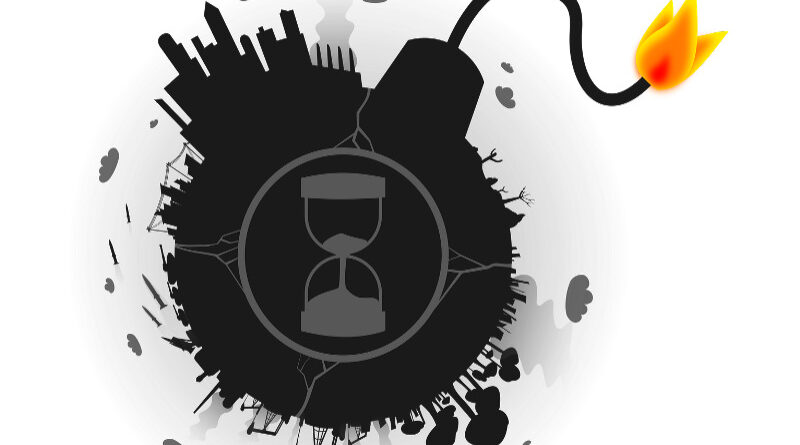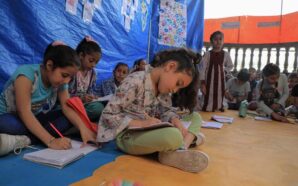The Occupied Palestinian Territory lies within the Mediterranean Climate Zone and is one of the most vulnerable countries in terms of climate change. A typically hot, arid and water scarce region, the entire area has experienced an alarming rise in temperature over the past 50 years. That said, it is ironic that Palestine has negligible contribution to global emissions – less than 0.01 percent.
A UN Factsheet, published in May 2022 stated: “Palestine’s per capita emissions were 0.8 tCO2e in 2011, less than the global average of 6.73 tCO2e per capita at that time.”
While worldwide temperatures rose by an average of 1.1°C since pre-industrial times, the situation displayed an alarming scenario in Israel and OPT with temperatures rising by 1.5°C (2.7°F) between 1950 and 2017. As per the Israeli Meteorological Service’s forecast, temperatures will increase by 4°C (7.2°F) by the end of the century.
Systemic Challenges vis-à-vis Climate Vulnerabilities
It is certainly not rocket science to see that issue of climate change is not just a natural but a political challenge as far as Palestine is concerned. A wide array of problems arise not just due to its geographic positionality, but also because of the restrictive measures, debilitating policies and gripping control by Israel.
Palestinian lands have been subject to massive water scarcity and food insecurity especially due to the air, sea and land blockade beginning in 2007. According to a 2022 article by Relief Web: “The lives of more than two million Palestinians in besieged Gaza are affected by Israel’s direct and indirect targeting of the environmental components and their right to live in dignity is denied.”
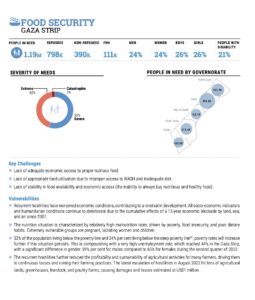
Humanitarian Needs Overview OCHA Working Document Jan 2023
Natural resource management, lack of funding and as well as an incapacitated infrastructure has had dire ramifications in terms of OPT’s environmental crisis. There has been little or no upgradation or repair over the last one decade, states an OCHA report. Implementing new infrastructural projects in high risk flooding areas have been limited due to lack of funding as well as import restrictions on essential material.
Chronic energy crises, not only a consequence of the decades-long blockade but the constant onslaught of violence as well as restriction on mobility has destabilized the operational capacity of facilities. Additionally, about 90 percent of electricity to Palestine was supplied by Israel Electric Corporation.
In addition to this, lack of or restrictive access to land and natural resource by the indigenous population has resulted in water scarcity, water, land and air contamination; leading to water quality deterioration, air pollution and desertification.
Another dire form of climate oppression also materializes in the form of land grabs or what is termed as green colonialism/imperialism. “In the occupied Gaza Strip, 20 percent of arable land is limited from use within the Israeli-imposed buffer zone near the apartheid fence, which leading to a deterioration in food insecurity. Overexploitation of Palestinian natural resources in the occupied Palestinian territory contributes to the exhaustion of non-renewable resources and the exacerbation of climate change-related endangerment of fragile ecosystems. Since the 1960s, the Dead Sea has shrunk by one third of its surface due to combined factors including temperature rises, accelerating evaporation, mineral extraction and agriculture-related water pumping,” states a paper submitted to the Office of the High Commissioner for Human Rights (OHCHR).
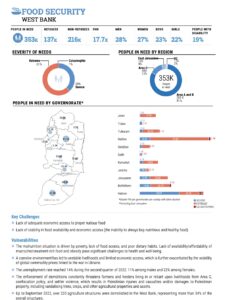
Humanitarian Needs Overview OCHA Working Document Jan 2023
Even more distressing is the fact that about 95 percent of water in Gaza has been deemed undrinkable as of 2020. And with the current state of affairs, the situation is more likely to have gravely deteriorated.
While Palestine was reported to experience medium water stress and being the 28th most water-stressed country in the world, projections to 2040 do suggest incremental stress levels. Palestine, states UNICEF, “has a total of renewable water resources per capita of the equivalent of 472 liters per capita per day, which is 40% lower than the Middle East and North Africa (MENA) median, and 18 times lower than the global median (FAO, 2018). Only 3% of the 190.5 Million Cubic Meters (MCM) of water, extracted yearly from the coastal aquifer, can be considered potable, according to World Health Organization (WHO) standards (PCBS, 2022).”
As a ripple effect, water contamination, scarcity and desertification inadvertently leads to massive food insecurity. Rise in salinity in groundwater along with unavailability of clean water sources leads to harmful impacts on coastal agriculture. “Adverse impacts are gravely felt on the olive sector, where rising temperatures and humidity, scarcer water resources and increased violent winds impact flowering and growth, cause direct stress on the olive trees, the quality and quantity of their fruits, cause loss of leaves, fruit destruction and definitely endanger livelihood security, and small farmers’ ability to compete with larger producers.”
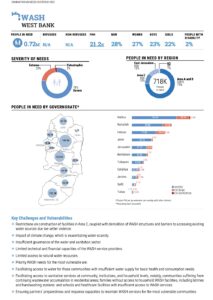
Humanitarian Needs Overview OCHA Working Document Jan 2023
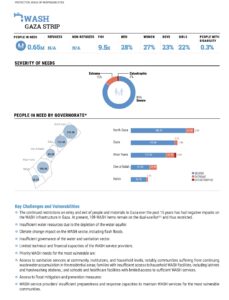
Humanitarian Needs Overview OCHA Working Document Jan 2023
In a report published by MinorityRights.org, Palestinian environmental activist, Abeer Butmeh narrated how farmers have had to innovate adaptive measure to counter not just climate shifts but also Israeli occupation practices. “The Israeli occupation has now designated more than half of the agricultural land in the Jordan Valley as closed military zones. Consequently, Bedouin communities who depend heavily on pasture land and livestock have had to adapt to limited access to ever-shrinking areas and natural resources. Relying on rainwater for their agriculture and animal husbandry means that they are highly vulnerable and at risk because of fluctuating rainfall and temperature change,” she explained.
Palestine is also vulnerable to natural disasters including floods, droughts, landslides and earthquakes.
Another pivotal issue that has impacted the environment is solid waste management, with no proper management strategy which may also be directly linked to restrictions imposed by the Israeli government in terms of access to land and resources. The territory also suffers heavily from air pollution, a direct result of waste water discharged directly into the Mediterranean sea as well as persistent airstrikes, bombardment and its consequent infrastructural destruction and air pollution.
While continuously banning the entry of breakwater rocks from the West Bank to the Gaza Strip essential to prevent coastal erosion, Israel’s perpetual airstrikes, dropping of missiles, bombs, and explosive containing toxic chemicals as well as spraying White Sulphur as recent as post October 7th, bulldozing Palestinian farmlands has severely compromised especially Gaza’s environment.
Seeking Climate Justice
The ramifications of the climate crises on the land and population of Palestine are imminent and certainly not far away with depleted food and water resources, an environment impacting young and old alike.
Climate is a crisis of justice as it also exacerbates inequities that are reverberating across the entire region. Inequities and injustices inflicted upon an innocent population, again is another form of collective punishment. An overview of the crisis at hand, data vehemently informs us about the discrimination and injustice suffered in terms of resource distribution, and rightful access. The situation at hand has transcended from its natural or scientific origins, it is a political as well as a diplomatic phenomenon and it needs active support, advocacy from the international community – especially now more than ever. It is time to wake up.
IMAGE: PIXABAY
This article has previously been published on Ananke’s special overview edition titled Under Siege and can be viewed here.




